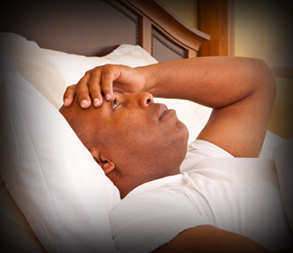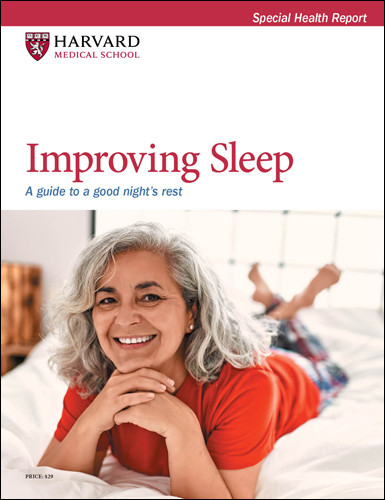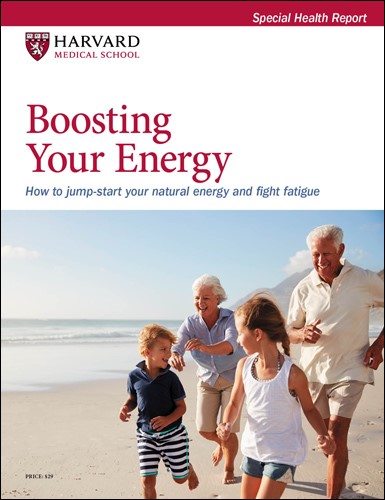
5 timeless habits for better health

What are the symptoms of prostate cancer?

Is your breakfast cereal healthy?

When pain signals an emergency: Symptoms you should never ignore

Does exercise give you energy?

Acupuncture for pain relief: How it works and what to expect

How to avoid jet lag: Tips for staying alert when you travel

Biofeedback therapy: How it works and how it can help relieve pain

Best vitamins and minerals for energy

Should you take probiotics with antibiotics?


Improving Sleep: A guide to a good night's rest
When you wake up in the morning, are you refreshed and ready to go, or groggy and grumpy? For many people, the second scenario is all too common. Improving Sleep: A guide to a good night's rest describes the latest in sleep research, including information about the numerous health conditions and medications that can interfere with normal sleep, as well as prescription and over-the-counter medications used to treat sleep disorders. Most importantly, you’ll learn what you can do to get the sleep you need for optimal health, safety, and well-being.
Other Product Information
Do you have trouble falling asleep? Trouble staying asleep?
Remember when you could fall asleep as soon as your head hit the pillow and not wake up until the alarm went off?
As we get older, it becomes a little harder to fall asleep and stay asleep. But although our sleep patterns change, our need for sleep doesn’t. Just like diet and exercise, a good night’s sleep is essential for your good health, for keeping you alert and energetic, and for building your body’s defenses against infection, chronic illness, and even heart disease.
Improving Sleep is an instructive and fact-filled report from Harvard Medical School that explains why sleep often eludes us as adults. You’ll read about those habits and conditions that rob us of peaceful slumber. And most importantly, you’ll learn what you can do to again enjoy the satisfaction of a restful night’s sleep.
You learn not only what triggers insomnia but also how new techniques and therapies are helping men and women get to sleep more quickly — without the use of medications. You’ll read about the benefits of “strategic naps.” You’ll discover how to make your sleep surroundings more conducive to rest. And you’ll be told about seven things you should do — and not do — before going to bed.
Do you or your spouse snore? There are hundreds of devices marketed as aids to stop snoring. But do any work? The report will sort them out and will brief you on new procedures that are restoring quiet to the bedroom. Have you ever been screened for sleep apnea? The report gives you a six-question test that will help you determine if you need to be tested for this life-threatening condition.
Plus, you may want to speak to your physician after you read about those medications that can cause insomnia, drowsiness or even nightmares. And the report will share news about advances in controlling such sleep-troublers as heartburn, arthritis, nocturia, and restless legs syndrome.
Prepared by the editors of Harvard Health Publishing in consultation with Lawrence Epstein, M.D., Instructor in Medicine, Harvard Medical School; Program Director, Sleep Medicine Fellowship, Division of Sleep and Circadian Disorders, Brigham and Women’s Hospital. 53 pages. (2022)
How sleep loss harms your health
A growing number of studies have linked long-term sleep deficits with significant health problems.
Diabetes. A report in Diabetes Care found a sharp increase in the risk of type 2 diabetes in people with persistent insomnia. People who had insomnia for a year or longer and who slept less than five hours per night had three times the risk of type 2 diabetes compared with those who had no sleep complaints and who slept six or more hours nightly. As with overweight and obesity (which are also closely linked to type 2 diabetes), the underlying cause is thought to involve a disruption of the body’s normal hormonal regulation, but in this case, it results from insufficient sleep.
High blood pressure. Researchers involved in the diabetes study also evaluated risk of high blood pressure among the same group of people, which included more than 1,700 randomly chosen men and women from rural Pennsylvania. As described in the journal Sleep, the researchers found the risk of high blood pressure was three-and-a-half times greater among insomniacs who routinely slept less than six hours per night compared with normal sleepers who slept six or more hours nightly.
Heart disease. A number of studies have linked sleep deprivation with several well-known risk factors for heart disease, including higher cholesterol levels, higher triglyceride levels, and higher blood pressure. People who don’t get sufficient sleep also have higher blood levels of stress hormones and substances that indicate inflammation, a key player in cardiovascular disease. Some research suggests that chronic sleep deprivation (getting no more than four hours a night) may double a woman’s risk of dying of heart disease.
One common cause of poor sleep, sleep apnea (see page 31) also raises heart disease risk. The low oxygen and high carbon dioxide levels that occur in apnea-disturbed sleep raise levels of stress hormones. This boosts blood pressure and heart rate, putting stress on the cardiovascular system. Sleep apnea appears to increase the risk of heart attack, heart failure, and heart rhythm disorders such as atrial fibrillation. People with moderate to severe sleep apnea have three times the risk of stroke compared with people who don’t have the condition.
In the Wisconsin Sleep Cohort study, people with severe sleep apnea were three times more likely to die of heart disease during 18 years of follow-up than those without apnea. When researchers excluded those who used a breathing machine (a common apnea treatment), the risk jumped to more than five times higher. Apnea spells can trigger arrhythmias (irregular heartbeats), and the condition also increases the risk of stroke and heart failure.
Mental illness. A study of about 1,000 adults ages 21 to 30 found that, compared with normal sleepers, those who reported a history of insomnia during an interview were four times as likely to develop major depression by the time of a second interview three years later. And two studies in young people— one involving 300 pairs of young twins, and another including about 1,000 teenagers—found that sleep problems often developed before a diagnosis of major depression and (to a lesser extent) anxiety. Sleep problems in the teenagers preceded depression 69% of the time and anxiety disorders 27% of the time.
Dementia. A growing body of research suggests that sleep disturbances may increase the risk of developing Alzheimer’s disease. A report that pooled findings from 27 observational studies found that people with sleep problems were nearly 1.7 times as likely to develop cognitive impairments or Alzheimer’s than people without sleep issues. Experts believe that sleep helps clear the brain of amyloid, the protein thought to damage nerve cells in Alzheimer’s. A 2018 study in JAMA Neurology found that older people with excessive daytime sleepiness were more likely to show increased amyloid in their brains over time. However, it’s not yet clear whether disrupted sleep contributes to amyloid buildup or vice versa.
Viral infections. Anecdotal evidence supports the notion that when you’re tired and run-down, you’re more likely to get sick. A study in Archives of Internal Medicine offers some proof. Researchers tracked the sleep habits of 153 men and women for two weeks, then quarantined them for five days and exposed them to cold viruses. People who slept an average of less than seven hours per night were three times as likely to get sick as those who averaged at least eight hours.
Weight gain. Not getting enough sleep makes you more likely to gain weight, according to a review article in the journal Obesity that analyzed findings from 36 studies. The link appears to be especially strong among children. Lack of sufficient sleep tends to disrupt hormones that control hunger and appetite, causing you to eat hundreds of extra calories per day—in particular, quickly digested carbohydrates. What’s more, the resulting daytime fatigue often discourages you from exercising. Excess weight, in turn, increases the risk of a number of health problems— including some of those listed above.
- Sleep mechanics
- Quiet (non-REM) sleep
- Dreaming (REM) sleep
- Sleep architecture
- Your internal clock
- Sleep throughout life
- Dangers of sleep deprivation
- Complete sleep deprivation
- Partial sleep deprivation
- How long-term sleep loss harms your health
- SPECIAL SECTION
Practical tips for sounder sleep - Medical conditions that disrupt sleep
- Insomnia
- Types of insomnia
- First-line treatment: Behavioral changes
- Prescription medications for insomnia
- Over-the-counter sleep aids
- Breathing disorders in sleep
- Snoring
- Sleep apnea
- Movement disorders and parasomnias
- Movement disorders
- Parasomnias
- Narcolepsy
- Symptoms of narcolepsy
- Treatments for narcolepsy
- Disturbances of sleep timing
- Delayed sleep phase syndrome
- Advanced sleep phase syndrome
- Non-24-hour sleep/wake rhythm disorder
- Jet lag
- Sunday insomnia
- Shift work
- Seasonal affective disorder
- Evaluation of sleep disturbances
- When to seek help
- Sleep testing
- A sample sleep history questionnaire
- Resources
- Glossary
You might also be interested in…

Boosting Your Energy
Fatigue is a symptom, not a disease, and it’s experienced differently by different people. Fatigue from stress or lack of sleep usually subsides after a good night’s rest, while other fatigue is more persistent and may be debilitating even after restful sleep. Harvard’s Special Health Report Boosting Your Energy provides advice and information from world-renowned medical experts that can help you discover the cause of your fatigue and find the right treatment or lifestyle changes.

5 timeless habits for better health

What are the symptoms of prostate cancer?

Is your breakfast cereal healthy?

When pain signals an emergency: Symptoms you should never ignore

Does exercise give you energy?

Acupuncture for pain relief: How it works and what to expect

How to avoid jet lag: Tips for staying alert when you travel

Biofeedback therapy: How it works and how it can help relieve pain

Best vitamins and minerals for energy

Should you take probiotics with antibiotics?
Free Healthbeat Signup
Get the latest in health news delivered to your inbox!
Sign Up